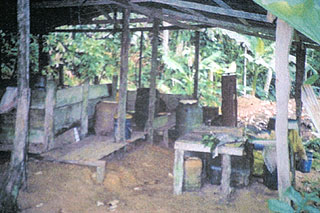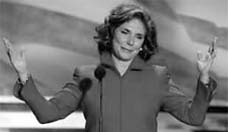November 6, 2004: Headlines: COS - Colombia: Drugs: Crime: Miami Herald: While it may seem preposterous to many in the United States, it's a commonly held belief here that Peace Corps volunteers first taught Colombians how to process coca leaves into cocaine
Peace Corps Online:
Directory:
Colombia:
Peace Corps Colombia :
The Peace Corps in Colombia:
November 6, 2004: Headlines: COS - Colombia: Drugs: Crime: Miami Herald: While it may seem preposterous to many in the United States, it's a commonly held belief here that Peace Corps volunteers first taught Colombians how to process coca leaves into cocaine
- January 21, 2005: Headlines: COS - Colombia: Drugs: Crime: Movies: Christian Science Monitor: Interestingly, the movie "El Rey" mixes biographical fact with the urban legend that members of the Peace Corps opened the market for Colombia's cocaine three decades ago. In the film, a Peace Corps worker named Harry works with El Rey to move cocaine to New York and other US cities. Monday, November 26, 2007 - 7:49 pm [3]
- January 12, 2005: Headlines: COS - Colombia: Drugs: Crime: Movies: The Globe and Mail: El Rey is one of the 50 movies in the running for this year's foreign-language Academy Award. An urban legend plays a key role in the movie -- American Peace Corps workers teamed up with El Rey and other early traffickers to bring cocaine to U.S. soil Wednesday, January 12, 2005 - 4:36 pm [1]
- Trafficking Friday, December 10, 2004 - 3:51 pm [1]
- Read more about the making of the movie "El Rey" Thursday, November 16, 2006 - 12:40 pm [9]
While it may seem preposterous to many in the United States, it's a commonly held belief here that Peace Corps volunteers first taught Colombians how to process coca leaves into cocaine

While it may seem preposterous to many in the United States, it's a commonly held belief here that Peace Corps volunteers first taught Colombians how to process coca leaves into cocaine
Popular film revives Peace Corps rumors
The top movie in Colombia is about the origins of the cocaine trade with an unexpected villain: the U.S. Peace Corps.
BY STEVEN DUDLEY
sdudley@herald.com
Caption: Once picked, coca leaves are brought to a shed like this, called a laboratorio. The leaves are crushed and sent through a press to create a paste, which is either used locally or sold to drug traffickers to be made into cocaine.
From almost the moment the new Colombian movie El Rey begins, it's clear who the villain is.
It's not the charming protagonist, Pedro Rey, who goes from poor bar owner to cocaine kingpin. It's not his friend, El Pollo, who betrays him in business and in love.
It's those idealistic, do-gooders from the U.S. Peace Corps who were sent by President Kennedy to slow the pace of revolution in Latin America at the time the movie is set, the late 1960s, but allegedly brought with them the scourge of a new disease: cocaine processing and trafficking.
COMMON BELIEF
While it may seem preposterous to many in the United States, it's a commonly held belief here that Peace Corps volunteers first taught Colombians how to process coca leaves into cocaine. U.S. officials and Peace Corps veterans have long denied the allegation, but some Colombian historians and journalists have kept it alive for years.
El Rey's director and screenwriter, Antonio Dorado, is careful to categorize his film -- in which he also attacks corrupt police, unscrupulous politicians and half-hearted revolutionaries -- as fiction. But he says he has ample anecdotal and documentary evidence that some Peace Corps volunteers participated in the beginnings of what has become a devastating social, military and economic problem for both the United States and Colombia.
"I'm not selling this as the real story. It's the people who say this is the real story," he told The Herald. "This reverses the idea that the North Americans were the victims; they were the protagonists. This is our vision."
Colombians are responding. Critics have raved about El Rey; fans wait in long lines to get autographs from the film's stars. Through its first three weeks in movie houses, it drew 180,000 people, making it the most popular film in the country.
The allegations of Peace Corps volunteer involvement in the birth of the cocaine industry are sketchy.
The process by which coca becomes cocaine is well over 100 years old. By the 1960s, both Cuban and Chilean traffickers were transforming the leaf into the powdery substance that people in the United States and elsewhere were already consuming.
One ex-Peace Corps volunteer from the time, Bruce Bagley, says rumors of American involvement in the birth of the cocaine industry here were common but false. He says that in other parts of Latin America, volunteers were accused of forced sterilizations or working with the CIA.
"This is absolutely false," said Bagley, now a political science professor at the University of Miami who does extensive research on drug trafficking in the Andes. "I've looked into this. The original chemical processing labs were in Chile."
"Research on Colombia is practically nonexistent," added historian Paul Gootenberg, the editor of Cocaine: Global Histories. "The books written are, with all due respect, journalistic."
CHILEAN CHEMISTS
Bagley and Gootenberg say that the first chemists probably came from Chile in the early 1970s. Most of them, they say, were probably working with Cuban traffickers but had to relocate to Colombia after Gen. Augusto Pinochet's military coup in Chile in 1973.
Ricardo Vargas, a Colombian who has written several books on drug trafficking, said he finds it hard to believe the Americans could teach Colombians anything about coca. "I've heard that rumor about the Peace Corps, but I never paid much attention to it," he said.
For his part, Dorado says he researched and worked on his film for six years.
Dorado is a professor of film at the University of Valle in the south-central city of Cali, where the movie is set. He's from a poor neighborhood, San Nicolás, where he claims some of the first Colombian drug traffickers began to ply their trade.
El Rey, for example, is loosely based on a trafficker nicknamed The Cricket, a Robin Hood-like figure who, like those who would come after him, used his drug earnings to win over the poor.
Kennedy's Latin American development program, the Alliance for Progress "is supposed to stop the revolution in Latin America," Dorado said. "But the antidote that comes in is contaminated with ambition. So instead of stopping the bad part, it helps create something worse."
When this story was posted in November 2004, this was on the front page of PCOL:
 | Director Gaddi Vasquez: The PCOL Interview
PCOL sits down for an extended interview with Peace Corps Director Gaddi Vasquez. Read the entire interview from start to finish and we promise you will learn something about the Peace Corps you didn't know before.
Plus the debate continues over Safety and Security. |
 | Schwarzenegger praises PC at Convention
Governor Schwarzenegger praised the Peace Corps at the Republican National Convention: "We're the America that sends out Peace Corps volunteers to teach village children." Schwarzenegger has previously acknowledged his debt to his father-in-law, Peace Corps Founding Director Sargent Shriver, for teaching him "the joy of public service" and Arnold is encouraging volunteerism by creating California Service Corps and tapping his wife, Maria Shriver, to lead it. Leave your comments and who can come up with the best Current Events Funny? |
Read the stories and leave your comments.

Some postings on Peace Corps Online are provided to the individual members of this group without permission of the copyright owner for the non-profit purposes of criticism, comment, education, scholarship, and research under the "Fair Use" provisions of U.S. Government copyright laws and they may not be distributed further without permission of the copyright owner. Peace Corps Online does not vouch for the accuracy of the content of the postings, which is the sole responsibility of the copyright holder.
Story Source: Miami Herald
This story has been posted in the following forums: : Headlines; COS - Colombia; Drugs; Crime
PCOL14685
20
.
Read more about the making of the movie "El Rey"

Read more about the making of the movie "El Rey"

Some postings on Peace Corps Online are provided to the individual members of this group without permission of the copyright owner for the non-profit purposes of criticism, comment, education, scholarship, and research under the "Fair Use" provisions of U.S. Government copyright laws and they may not be distributed further without permission of the copyright owner. Peace Corps Online does not vouch for the accuracy of the content of the postings, which is the sole responsibility of the copyright holder.
Story Source: PCOL
This story has been posted in the following forums: : Headlines; COS - Colombia; Drugs; Crime; Movies
PCOL14740
2
.
When I saw the title, I thought Michael Moore had made another "documentary".
Mayhap now RPCV's can understand how many of us felt by MM's previous screeds.
oz
|
By RPCV (ca-stmnca-cuda1-blade10a-234.stmnca.adelphia.net - 68.65.210.234) on Tuesday, November 09, 2004 - 8:06 pm: Edit Post |
The power of propaganda .. Hitler used it well ... as did Michael Moore (I like the reference). Who cares about the truth.
I hope the Peace Corps responds to this film.
After I left Brazil in 68 I heard stories that PCV's had "deflowered" the maidens of the Northeast. Then, that we had established a revolving ring of said deflowered maidens, moving them from metropolis to metropolis. I have a hunch that there were prostitutes in Brazil even before the Peace Corps arrived.
As for PCV's teaching how to make Cocaina --that's a backhand slap at Colombian chemists and criminals. The infos out there anyone can get it. Like how to make an atomic bomb. Fucked up, isn't it!
Antonio Dorado's movie may do more to bring the world's attention to the Peace Corps than all the Young and Rubicam posters of the 1960's. It will probably be the first Colombian-made movie ever screened in the White House. As to the veracity of Peace Corps role in initiating the drug trade let's examine what Dorado said. In response to a question posed by Jaime Arias, journalist with El Tiempo, "What was the beginning of the narco-trafficking?," Dorado replies "There are several hypotheses." One he offers is, ". . . in the 60's and 70's it [narco-trafficking] began with the young Americans that worked for the Peace Corps in rural areas. The film recreates a little of these myths . . ." As for any hard evidence, nada, proving only that a sexy rumor is more interesting than fact. One fact worth noting is that the manufacture of psycho-trophic drugs and medicinal use of coca by South American Indians pre-dates the arrival of the Spanish Conquistadores.
I was a PCV in Colombia One, and following my tour lived in a rural area south of Cali for 10 years. For years, I had anthropology students in rural villages and for a while was affiliated with a research and training program run in collaboration with the Universidad del Valle where Dorado teaches. During those years I heard many rumors and stories but never one that linked PCVs with cocaine production. If Dorado makes a sequel, the source of the rumor will be revealed as a Texas oil executive whose advances to a female volunteer (to be played by Nicole Kiddman) are firmly rejected. I can't wait to see it.
As a 1965 PCV in the rainforest Chapare (Bolivia), I was surrounded by campesinos drying their coca crops on tarps. Compressed into bales, the leaves were transported to the Cochabamba highlands where campesinos chewed them, along with the essential catalyst made from ashes, to ease the hardships of their lives.
While it was widely rumored then that much of the coca crop found its way into clandestine coca mills, there was never a suspicion that PCV's were involved in cocaine production.
Recalling the naivete' that most of us recent college graduates brought to our assingments in Bolivia, it is hard to imagine PCV's teaching the science of cocaine manufacturing. I would expect this to have been equally true then in Colombia.
|
By eed (66.251.56.62) on Wednesday, December 08, 2004 - 8:00 am: Edit Post |
Using the U.S. as a scape-goat always makes other countries feel better...so what else is new! We should feel grateful that we can oblige.
|
By eed (66.251.56.62) on Wednesday, December 08, 2004 - 8:05 am: Edit Post |
Using the U.S. as a scape-goat always makes other countries feel better...so what else is new! We should feel grateful that we can oblige.
As a RPCV who served in Colombia from 1967 to 1969, I must admit to consternation and anger that such stupidity can be credible. In my two years in Colombia, I never heard a volunteer mention cocaine. Nor did I hear any official comments by our administrators. The great majority of us were naive and optimistic young people.
Granted, there will be a few bad apples in every barrel, but there were damn few that I knew of, and even those few would not have stooped that low.
As the Peace Corps staffer resident in Cali from 1967-70, I can categorically deny the veracity of this ridiculous charge. The most serious "drug" I ever heard about was panama red, a potent form of marijuana that I was told some Volunteers enjoyed from time to time. Peace Corps had in place a strict zero tolerance policy on drug use. I didn't look for drug use but I made it clear that even guilt by association would compromise a volunteer's integrity and would result in the "Braniff Award" back to his or her home of record.
I had to terminate the service of some Volunteers for non-performance but never for drug use.
Thirty years later, I was privileged to serve as PC country director in Chile and again had the honor of working with the finest young people America has to offer. Thirty years had changed much but not the quality and dedication of the PCV's.
|
By Anonymous (pool-72-65-155-216.chrlwv.east.verizon.net - 72.65.155.216) on Thursday, December 07, 2006 - 11:40 am: Edit Post |
My first English teacher was Edward (McArthur?) Meadows, in Mirand in the north of Cauca's state.
I am looking to find him to say thanks, and that he did good for our town...








